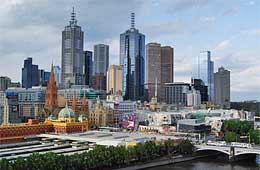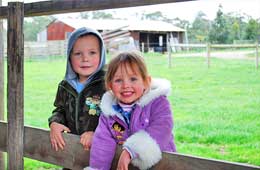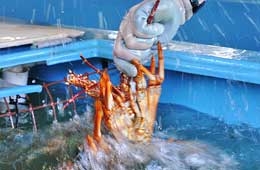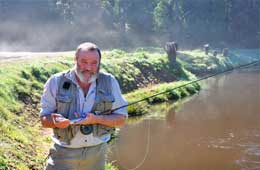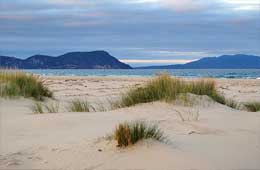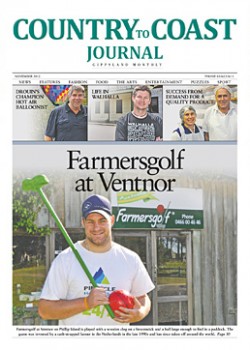Gippsland Country Life magazine
SINCE her mid-teens Helene Armour, a devoted wife, mother and grandmother has implemented one community project after another and left them trailing as a legacy throughout the West Gippsland area where she lives, and throughout the state of Victoria.
When her inspirational achievements were recently acknowledged with an Order of Australia Medal for her services to the fruit growing industry and local government, a confident yet unpretentious Helene said she was shocked. “I was helping my daughter and minding my grandchildren when the letter arrived and I sat down on a stool with my legs shaking. Oh my gosh I couldn’t believe it.”
In her naturally lit, elegant country home, Helene discusses her excitement and apprehension about receiving the award saying, “so many people should be coming with me.” As her grandchildren climb onto her lap with a book in front of the fire, and her daughters Corrinne and Fleur warmly reminisce about the times their mother read to them as children, it’s clear her family have been at the forefront of her achievements. Through the large windows of her home and beyond a neatly laid garden is a view of Gippsland’s fertile hills and a neat extensive apple orchard, which seems to be the glue that joins the family together.
Helene however, grew up in Drouin, a town 97 kilometres east of Melbourne and attended local government schools until her fifth secondary year. It was then she embarked on her first community project. She said she and a friend liked playing hockey so they gathered up others who also enjoyed it to form the Drouin Tigers Hockey Club. They designed yellow and black uniforms and asked their sports mistress to help them and in a few years, the club was strong. “It still exists and the girl that worked with me is still a friend,” she said. “It was an early experience of what you can do if you club together. I still remember the feeling of cooperating and everyone getting something out of what we were doing.”
In the mid-1960s, without any rural background, Helene moved to the first family orchard after marrying Ian, a third generation orchardist. Thirteen years later, after the birth of their children, they moved to a second property in the area where they built a new home and planted a new orchard. The couple became partners in the family affair with Ian’s brother and his wife who live on the original family farm, which was planted by Ian’s great uncle in the 1920’s. The family also have a dairy farm next to the orchards operated by a sharefarmer and his wife with almost 400 cows. “They are great people,” Helene said. “They milk on the original farm and use our farm as a turn out paddock.”
As Helene developed her role on the orchard, she did everything except spray. “I did the bookwork, I picked fruit and I packed,” she said. “When Corrinne was little, I used to put her in a bulk bin in the shed with chalk and while I packed she’d draw on the sides, and she made porcupines with apples and nails – things that would be frowned upon now.”
When her second child Fleur was born, Helene said she got together with another young mother to form the first Nursing Mothers Association in Eastern Victoria. “I didn’t want to do it on my own and neither did she so I took on the leadership role and she backed me as a deputy. They were interesting years and great friendships.”
After her children started school, Helene started working during school hours as an electorate secretary for local politicians. Later she worked for herself and developed an information program for the then Warragul and Buln Buln Shires.
Once her girls had grown up and completed their university courses, she decided to study an Arts Degree in Community Development at Deacon University. “I loved study,” she said. “I was still working at Morwell at the time and working on the farm and I used to catch a train then a tram and walk. Both our girls were overseas then so I wrote to them on the way home – a page each.” Helene said she initially did some TAFE subjects at the insistence of the Narracan Council who she was working with. When someone suggested she go on the board, so she took up the challenge and served for eight years, with one accreditation being the realisation of a TAFE Campus in Warragul.
Through the university course, she studied planning at Melbourne University and worked on information projects for various Victorian Shire Councils. “Sometimes I worked on my own and sometimes with others who had more skills than I did,” she said, “but I loved that work, I love planning and I loved working with community groups.”
In 1997, when the Shires of Warragul, Buln Buln and Narracan amalgamated to become the Baw Baw Shire, Helene was elected Councillor. She said one of the first things they did was pull out the parking meters in Warragul because although it was revenue for the Shire, the town was being underutilised”. She headed up a planning committee and she developed the Queen Street historical precinct in Warragul.
At the end of her term, Helene stood again and said she was disappointed when she didn’t get in. “I think perhaps not everybody supported my ideal of land use to the extent that there was a move against me. I believed that small lot subdivisions were detrimental to farming in the area, but these things happen and it’s a pretty good municipality really.”
She was also concerned about the direction of Melbourne University’s McMillan Campus in Warragul and became involved in the establishment of an Advanced Diploma in Agriculture (Dairying). Once that was achieved, she was asked to help establish a Diploma in Production Horticulture. She said, “Once again, I pulled a committee around me of brilliant people who are still friends and we developed a new model with a lot of practical study on orchards.. Later the Education Centre of Gippsland took over the McMillan Campus and Helene became Chair of the Horticulture and Agriculture Industry Committee. The Diploma changed to something broader and become an Advanced Diploma in Rural Business Management.
She said about the same time, the Wesley Church in Warragul was in a bad state and there was a call to demolish it and sell the land. “A group of people in the community felt as a prominent landmark it needed to be saved so a few of us formed a committee and I became President.” They started by having the church listed under the National Trust of Australia and Heritage Victoria, to protect it. Then with the help of a local surveyor, service groups, professional people and many others in the community who donated their time and money, they purchased Wesley with a footprint of land. “We also received State Government funding of $275,000 over two years, which was absolutely staggering.” she said. Wesley of Warragul is now a wonderful public venue for the West Gippsland Community and Helene is still President.
When there was a risk of fire blight to the apple industry, she became an executive member of the Victorian Fire Blight Task Force. She was also an executive member of the Orchardists and Fruit Cool Stores Committee for Southern Victoria until 2005 when it merged with Northern Victorian Fruit Growers to become Fruit Growers Victoria and Helene became a director. It was there she said she met a wonderful friend and the pair pulled together some young growers to promote apples and piloted a program for schools called ‘Fruit for Life’. “We designed a giant-sized Aussie Apple character and went into schools in and around Melbourne. Initially we talked to all primary school children but we found that Aussie Apple didn’t appeal to the older ones. I remember one day hearing a kid say ‘I’m going to kick that apple’. We decided then to only talk to lower primary children.” The ‘Fruit for Life’ program now also covers the Mornington Peninsula and Northern Victoria.
Helene, who has managed to fit even more into her life than this is now taking a step back, but she believes in her unassuming way that working together is the way to achieve anything. “If I had pulled out of any projects I was involved in, I’m sure they would have kept going,” she said. “It’s as a group we’ve been able to do things.”
By Wendy Morriss (formerly Thompson)
Copyright © 2012 Wendy Morriss: Freelance Journalist. All Rights Reserved.
